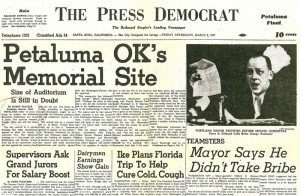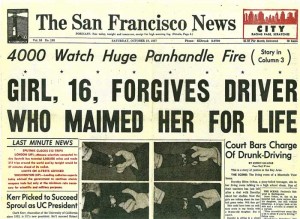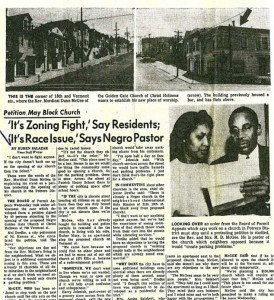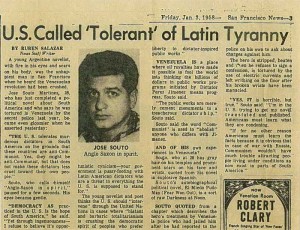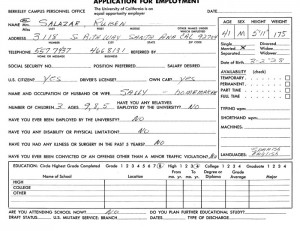The Missing Years: Northern California
Ruben Salazar was one of the most renowned Latino journalists of his time. He was known for his powerful articles covering the Mexican-American community in Los Angeles and the Chicano Civil Rights Movement.
Salazar was born in Ciudad Juarez, Mexico and grew up and first worked as a reporter in El Paso, Texas in the 1950s. Because he spent much of his time as a prominent journalist based in Los Angeles prior to his death in 1970, many people assume that he moved straight from El Paso to Los Angeles. However, the real story is that between his years in El Paso and Los Angeles Salazar worked for several years in Northern California, first for the Santa Rosa Press Democrat and then the San Francisco News.
Salazar worked as a reporter at the Press Democrat for a little over a year from 1956 to 1957. While there, he covered the city of Petaluma in Sonoma County as the Petaluma bureau chief for the Press Democrat. He wrote about the education, politics, the city, health, social issues, crime, current news, the poultry industry, beauty pageants – pretty much anything he found to be interesting and/or important in the rural community of Petaluma.
For example, in the story, “Petaluma OK’s Memorial Site” which made the front page headline of the Press Democrat on March 8, 1957, Salazar wrote about the city council of Petaluma which ”…unanimously agreed to allow the county to construct the War Memorial building on a city-owned site at Washington and Payran streets. Four out of six councilmen present also agreed the county should pay for the site. The latter decision, according to Supervisor Leigh Shoemaker, might be responsible for Petaluma getting an 850-seat auditorium instead of a 1,200.” Few, if any, of Salazar’s stories during this time involved Mexican Americans.Salazar also wrote a column called “Petaluma on Parade,” which covered social issues, problems, and just about anything happening in Petaluma. Quotes from these columns were collected in 2005 by USC senior Fabiola Rangel, who wrote a term paper on Salazar’s years in Northern California. For example, when covering the Miss Sonoma County Contest in 1957, she quoted Salazar as writing, “Every year thousands of pretty girls compete for queen of this or that all over the country. Just what makes a girl don a bathing suit and parade up and down before a panel of judges in the hope that she will become queen? The publicity? The prizes? The fun? Probably all these reasons. But there is more. At present there are five girls who have signed up for the Miss Sonoma County Contest of the Fourth District Fair to be held in August,” (July 19, 1957).
He also wrote about personal experiences when an earthquake hit Petaluma his column, “Just looked in the mirror and saw my first grey hair. You see, I’ve experienced my first earthquake. Sandstorms and bull throwing we have in Texas. But earthquakes we don’t allow. So if I was a little livid at 11:46 am Friday you must understand that I wasn’t scared – I was mortified. Others took it better,” (March 24, 1957).
Salazar was not afraid to write about more controversial issues in his column as well. In 1956 Salazar published in the Press Democrat, “Is our city government going to rot? The bitter discord among city government members brings about the obvious question: Can our public servants, as they stand now be able to do any constructive work? The question of whether city employees should get pay raises has widened the chasm between the political philosophies of city council members,” (December 8, 1956).
Some of Salazar’s work at the Press Democrat even forecast the passion for reporting tough stories later found in his Los Angeles articles. In 1957, he wrote in his column, “Probably a newspaper’s most important function is to inform. In a free country the people have the right to know and a newspaper’s first duty is to give them the facts – pleasant or unpleasant,” (June 9, 1957).
During his time at the Press Democrat, Salazar was known for being a straightforward, no-nonsense journalist, covering the city’s concerns as he saw it to be true. His writings caused dissatisfaction and uncongenial sentiments among the Petaluma Police Department and some politicians towards Salazar. USC student Fabiola Rangel quoted his wife, Sally, as once saying, “when Ruben knew he was right, no one could intimidate or frighten him.” Rangel added, “He did not and would not restrain himself from writing what he thought was to be said – the truth.”
After leaving his job at the Santa Rosa Press Democrat, Salazar worked for the San Francisco News until the newspaper shut down. There he became a general assignment reporter for a big city newspapers covering politics, celebrities, and breaking news for stories that often ran on the front page. One story of Salazar’s that made the front page of the San Francisco News was headlined, “Girl, 16, Forgives Driver Who Maimed Her For Life: Court Bars Charge Of Drunk-Driving.” Another front-page story, “Sex Slaying Spurs War On No. Beach ‘Beatniks’: Addict Tells Why He Killed, Bistros Clampdown,” is another example of Salazar’s reporting making headlines in the San Francisco News. Other stories reported on racial and Latin American issues related to San Francisco. For example, in his article “’It’s Zoning Fight,’ Say Residents; ‘It’s Race Issue,’ Says Negro Pastor,” Salazar wrote about “…the case which developed from a petition signed by 60 persons objecting the opening of the proposed Negro Golden Gate Church of Christ Holiness at 700 Vermont St.” In this article, Reverend McGee explained, “It’s not the church they object to – it’s the color…if the city is sincere about treating all citizens on an equal basis then they are duty bound to let our church open.” In Salazar’s article “U.S. Called ‘Tolerant’ of Latin Tyranny,” Salazar interviewed a young Argentine novelist in San Francisco named Jose Suto Martinez, who said he had been tortured by secret police in Venezuela. According to Martinez, “The U.S. tolerates murderous dictators in South America on the grounds that these countries are anti-communist…Democracy as practiced in the U.S. is the hope of South America…yet through ingenuousness…your government is pussy-footing with Latin American dictators who are a threat to everything the U.S. is supposed to stand for,” (January 5, 1958).His Northern California colleagues interviewed by Fabiola Rangel in 2005 remembered Salazar fondly as an outgoing, friendly individual as well as a talented reporter. Hadley Roff, a friend and colleague of Salazar’s at the San Francisco News said, “Ruben was a person of considerable charm and a very keen insight of people. He had a very compassionate, sympathetic insight of people. He was a great reporter. A very convivial, outgoing professional. He had an enormous promise (as a professional), something he proved when he went to the Times.” Similarly, Harry Press, the former City Editor of the News during Salazar’s time at the newspaper said, “Ruben was extremely talented and dedicated to his work. A hero.”
Others remembered Salazar as a close friend, a talented reporter, a brave colleague, a fun guy, and all in all a nice person. According to Mary Thurber, a friend of Salazar’s, “He was utterly charming, a really nice guy; a very good friend. He was a top-class journalist. The fact that he was second-language speaker never affected his work; he wrote well and was one of the best reporters.”
Scott Thurber, a colleague of Salazar’s at the Press Democrat said, “Ruben Salazar was a close friend – a talented and sensitive guy, and a comfortable companion whose quick wit could be matched – just as quickly- by his acerbity. He was also a highly respected colleague. He was, to overwork phrase, my kind of newspaperman. But it means much more that he was your type of newspaperman: this was largely what he lived for and died for.”
“Ruben Salazar was one of the nicest guys I’ve ever known. And the gentlest: he was the personification of non-violence. But he was eminently capable of anger, and when he was angry he was a formidable man who cried out in print against inequities – whether they involved mistreatment of prisoners in the El Paso Jail, secret meetings of the Petaluma City Council, or the massive problem that obsessed in his last 10 years: the shabby treatment of Mexican-Americans in the barrio,” Scott Thurber continued.
However, Salazar was not remembered as only a journalist. Some who Rangel interviewed recalled him as a fun-loving guy in every way. According to Jack Levy, a friend and colleague of Salazar’s at the Press Democrat, “He was handsome, he drank, he was young, and he had fun.” Similarly, according another Press Democrat colleague and friend, Gaye LaBaron, recalled, “He was a fun loving guy. I remember him laughing – young, single, good looking reporter – he had a good time.”
In conclusion, although many people are unaware of the time Salazar spent in Northern California in the late 50s, it is clear that he made his mark in the Bay Area during the years worked there as a journalist for the Santa Rosa Press Democrat and the San Francisco News. Through his powerful, straightforward, truthful, and earnest writing and reporting as seen in his time in Northern California, Salazar was able to set the bar for his influential journalism in the years to come.
Additionally, Northern California must have made its mark on Ruben Salazar as well, which is evident in his half-filled-out job applications for a University of California at Berkeley teaching position, which were found in his possessions at the time of his death. According to his daughter Lisa Salazar Johnson, shortly before he was killed, Salazar had accepted a part-time teaching position as a weekly guest lecturer at the University of California at Berkeley for the fall of 1970.

